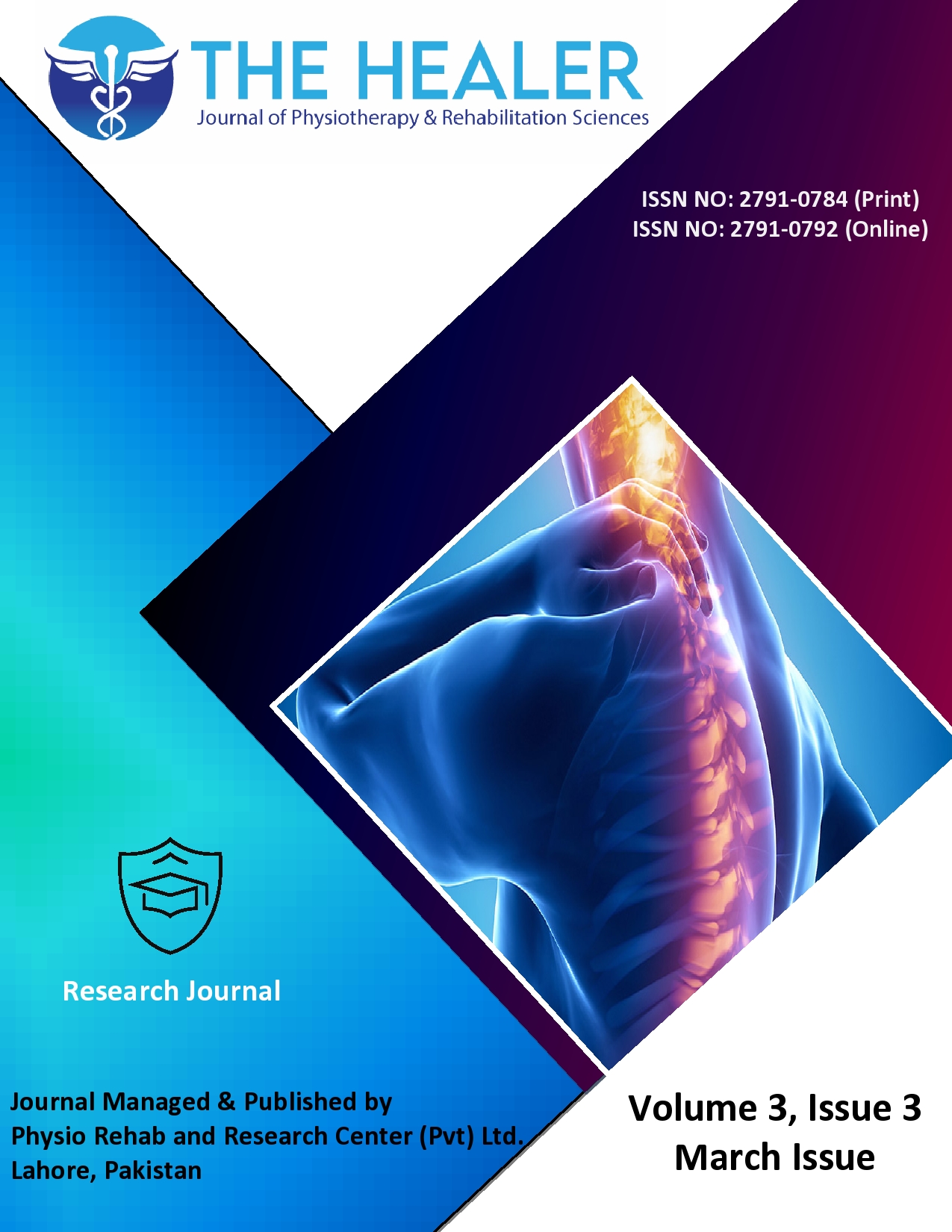Effects of Breakfast on Physical Activity, Attentiveness and Cognitive Functions in Young Adults of Islamabad, Pakistan; A Comparative Cross-sectional Study
Effects of Breakfast on Physical Activity & Cognitive Function
DOI:
https://doi.org/10.55735/hjprs.v3i3.131Keywords:
attentiveness, breakfast, cognitive functions, physical activity, young adultsAbstract
Background: The prevalence of breakfast skippers among the young population appears to be increasing. Several studies have been conducted on the breakfast routines of children and their effects, but young adults have been neglected. Objective: To compare the impact of breakfast eaters and skippers on physical activity, attentiveness and cognition in young adults of Islamabad, Pakistan. Methods: A comparative cross-sectional study, carried out at Shifa Tameer e Millat University Islamabad, Pakistan from August 2020 to January 2021. Healthy young adults of both genders aged 18-25 years were included except those having any active pathology, mental illness, sedative-hypnotics or smokers were excluded from the study. Informed consent was taken from each participant's priory. About 100 participants were enrolled in the study (50 in each group) through non-probability purposive sampling. Respondents were allocated to groups A (breakfast eaters) and B (breakfast skippers) based on the criteria taken from recent studies. Physical activity and attentiveness were measured through the standard international physical activity questionnaire short form and everyday life attention scale questionnaire respectively whereas cognitive functions were assessed using Stroop and digit span test. Results: The mean age of respondents in groups A (breakfast eaters) and B (breakfast skippers) was 21.6±1.77 and 21.3±1.80 years respectively. Physical activity and cognitive functions statistically showed no significant difference between the two groups (p>0.05). For attentiveness, all components of the everyday life attention scale questionnaire showed no significant difference (p≥0.05) except for the G component (preparing a meal) which showed a significant difference between both groups (p≤0.05). Conclusion: This study concludes that there is no significant difference in breakfast on physical activity, attentiveness and cognitive functions in young adults of Islamabad, Pakistan.
References
Nicklas TA, O’Neil C, Myers L. The importance of breakfast consumption to nutrition of children, adolescents, and young adults. Nutrition today. 2004; 39(1): 30-9.
Uzhova I, Mullally D, Peñalvo JL, Gibney ER. Regularity of breakfast consumption and diet: insights from national adult nutrition survey. Nutrients. 2018; 10(11): 1578.
Affinita A, Catalani L, Cecchetto G, De Lorenzo G, Dilillo D, Donegani G, et al. Breakfast: a multidisciplinary approach. Italian journal of pediatrics. 2013; 39(1): 1-10.
Garg M, Rajesh V, Kumar P. Effect of breakfast skipping on nutritional status and school performance of 10-16 years old children of Udupi district. Health and Population: Perspectives and Issues. 2014; 37(3-4): 98-117.
Gajre NS, Fernandez S, Balakrishna N, Vazir S. Breakfast eating habit and its influence on attention-concentration, immediate memory and school achievement. Indian Pediatrics. 2008; 45(10): 824.
Boschloo A, Ouwehand C, Dekker S, Lee N, De Groot R, Krabbendam L, et al. The relation between breakfast skipping and school performance in adolescents. Mind, brain, and education. 2012; 6(2): 81-8.
Sandercock G, Voss C, Dye L. Associations between habitual school-day breakfast consumption, body mass index, physical activity and cardiorespiratory fitness in English schoolchildren. European journal of clinical nutrition. 2010; 64(10): 1086-92.
Chico Barba LG. Breakfast nutritional quality and cognitive interference in university students from Mexico City. OPENAIRE. 2019.
Martínez-González MA, López-Fontana C, Varo JJ, Sánchez-Villegas A, Martinez JA. Validation of the Spanish version of the physical activity questionnaire used in the Nurses' Health Study and the Health Professionals' Follow-up Study. Public health nutrition. 2005; 8(7): 920-7.
Groen Y, Fuermaier AB, Tucha L, Weisbrod M, Aschenbrenner S, Tucha O. A situation-specific approach to measure attention in adults with ADHD: The everyday life attention scale (ELAS). Applied Neuropsychology: Adult. 2018.
Rabiee A, Vasaghi-Gharamaleki B, Samadi SA, Amiri-Shavaki Y, Alaghband-Rad J. Working memory deficits and its relationship to Autism Spectrum Disorders. Iranian journal of medical sciences. 2020; 45(2): 100.
Hantoro WD, Setyaningrum CTS, Dahlan P. Reliabilitas dan validitas backward digit span test dalam screening gangguan atensi anak sekolah dasar. Berkala NeuroSains. 18(2): 90-3.
Wang R-Y, Zhou J-H, Huang Y-C, Yang Y-R. Reliability of the Chinese version of the trail making test and Stroop color and word test among older adults. International Journal of Gerontology. 2018; 12(4): 336-9.
Uzun N, Tarakci E, Arman N, Ugurlu S. FRI0726B-HPR Investigation of physical activity levels of patients with behcet’s disease. BMJ Publishing Group Ltd; 2019.
Zhao Q-J, Zhang J, Xu L, Liu F-F. Identification of a five-long non-coding RNA signature to improve the prognosis prediction for patients with hepatocellular carcinoma. World journal of gastroenterology. 2018; 24(30): 3426.
Arora M, Nazar GP, Gupta VK, Perry CL, Reddy KS, Stigler MH. Association of breakfast intake with obesity, dietary and physical activity behavior among urban school-aged adolescents in Delhi, India: results of a cross-sectional study. BMC Public Health. 2012; 12(1): 1-12.
Keski-Rahkonen A, Kaprio J, Rissanen A, Virkkunen M, Rose RJ. Breakfast skipping and health-compromising behaviors in adolescents and adults. European journal of clinical nutrition. 2003; 57(7): 842-53.
Moy FM, Surin J, Ismail Y, Mahad R, Tie F, Wan Ismail W. Breakfast skipping and its associated factors among undergraduates in a public university in Kuala Lumpur. Malaysian journal of nutrition. 2009; 15(2): 165-74.
Madej P. The impact of female adolescents' attitudes toward advertising, locus of control, self-efficacy on body image and eating habits: Wayne State University; 1998.
Ewing-Cobbs L, Fletcher JM, Levin HS, Iovino I, Miner ME. Academic achievement and academic placement following traumatic brain injury in children and adolescents: A two-year longitudinal study. Journal of Clinical and Experimental Neuropsychology. 1998; 20(6): 769-81.
López L, Rodo X. A modified SEIR model to predict the COVID-19 outbreak in Spain and Italy: simulating control scenarios and multi-scale epidemics. Results in Physics. 2021; 21: 103746.

Downloads
Published
How to Cite
License
Copyright (c) 2023 The Healer Journal of Physiotherapy and Rehabilitation Sciences

This work is licensed under a Creative Commons Attribution 4.0 International License.
CC BY











